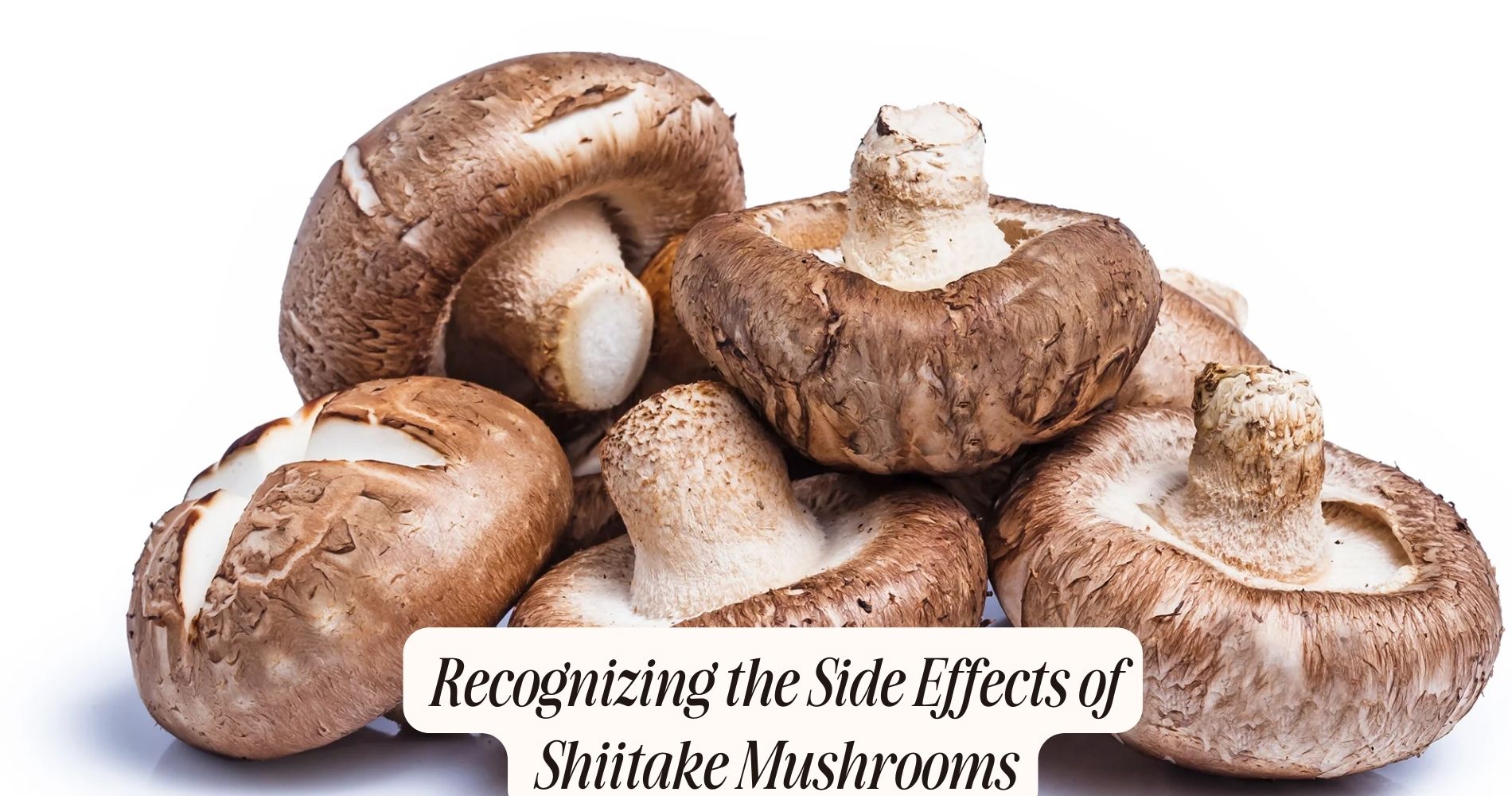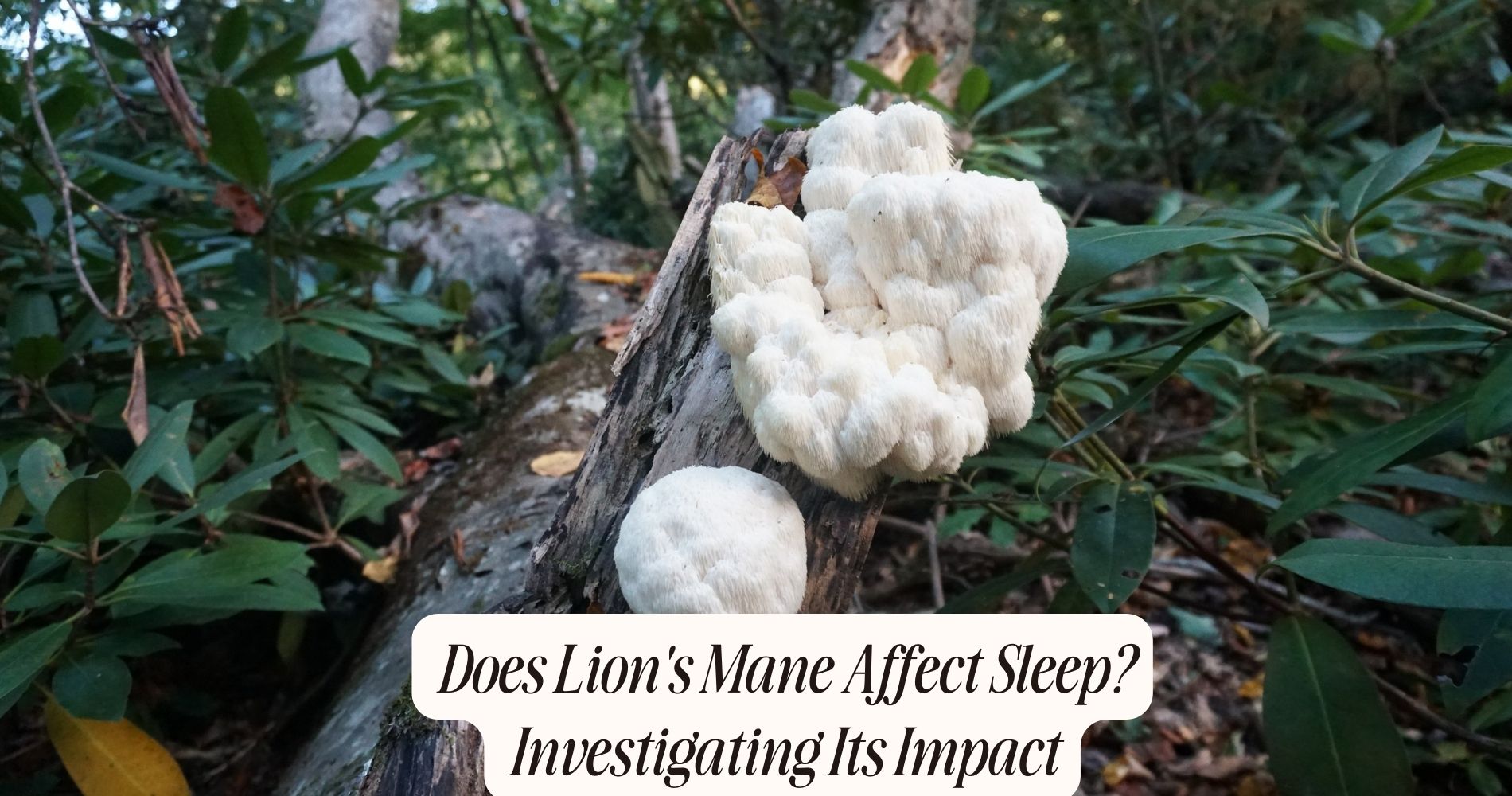
Recognizing the Side Effects of Shiitake Mushrooms
Recognizing the side effects of shiitake mushrooms helps you manage potential health risks. Common issues include shiitake dermatitis, characterized by whip-like erythematous skin rashes triggered by lentinan. Gastrointestinal symptoms like nausea, bloating, and diarrhea often arise from indigestible polysaccharides. Allergic reactions, though rare, can cause skin rashes, itching, or respiratory distress. Excessive intake or raw consumption can exacerbate these issues.
Additionally, bioactive compounds may influence blood pressure and interact with certain medications. Monitoring your reactions and consulting healthcare providers for personalized advice guarantees safe consumption. To uncover further details, explore additional considerations and management tips.
Shiitake Dermatitis
Shiitake dermatitis, a condition characterized by a distinctive erythematous rash, typically arises after consuming raw or undercooked shiitake mushrooms. You'll notice that the rash appearance is quite unique, often presenting as linear, erythematous, and pruritic streaks, which resemble whip marks. This rash is primarily due to a compound called lentinan, found in shiitake mushrooms, which can induce a toxic reaction when ingested in its raw form.
Clinically, the skin inflammation associated with shiitake dermatitis can be quite severe, leading to significant discomfort. The erythematous rash can develop within hours to a few days post-ingestion and may be accompanied by systemic symptoms such as fever or malaise. It's important to recognize these symptoms early, as misdiagnosis can lead to unnecessary treatments.

Topical corticosteroids are commonly prescribed to manage the skin inflammation, and antihistamines can be used to alleviate pruritus. However, the best preventive measure is to make sure that shiitake mushrooms are thoroughly cooked before consumption, as heat deactivates lentinan. If you suspect shiitake dermatitis, consult a healthcare provider for accurate diagnosis and appropriate management.
Gastrointestinal Issues
You might experience gastrointestinal issues after consuming shiitake mushrooms, including symptoms such as nausea, bloating, and diarrhea.
These digestive discomfort symptoms are relatively common and can be attributed to the indigestible polysaccharides found in the mushrooms.
To manage these digestive issues, consider reducing your intake or consulting a healthcare professional for tailored advice.
Digestive Discomfort Symptoms
After consuming shiitake mushrooms, some individuals may experience gastrointestinal issues such as bloating, diarrhea, and abdominal pain. These symptoms often manifest as a bloating sensation, which is the subjective feeling of abdominal fullness and distension. This can be accompanied by stomach cramps, which are characterized by sharp or aching pains in the abdominal region.
The underlying mechanisms may involve the complex polysaccharides found in shiitake mushrooms, such as beta-glucans, which can be difficult for some individuals to digest. These compounds can lead to increased gas production in the intestines, causing a bloating sensation and discomfort. Additionally, excessive intake of these mushrooms can impact the gastrointestinal tract's motility, potentially leading to diarrhea.
Abdominal pain, on the other hand, may result from the body's inflammatory response to certain components in shiitake mushrooms. This inflammation can aggravate the lining of the stomach and intestines, resulting in stomach cramps. Understanding these symptoms can aid in the identification of shiitake mushroom-induced gastrointestinal issues and encourage timely consultation with healthcare professionals for appropriate management.
Recognizing and addressing these symptoms promptly is vital for maintaining gastrointestinal health and overall well-being.
Common Gastrointestinal Reactions
Experiencing gastrointestinal reactions such as nausea, vomiting, and abdominal discomfort isn't uncommon when consuming shiitake mushrooms. These symptoms can be attributed to several factors, including the complex carbohydrates found in shiitake mushrooms, which may be difficult for some individuals to digest. The disruption of gut flora, the community of microorganisms residing in your intestines, can also play a significant role. An imbalance in gut flora can lead to increased intestinal permeability and inflammation, exacerbating gastrointestinal symptoms.

Furthermore, shiitake mushrooms contain polysaccharides, mainly beta-glucans, which can be challenging for your digestive system to break down. Adequate production of digestive enzymes is essential for the efficient breakdown of these polysaccharides. If your body doesn't produce sufficient digestive enzymes, you may experience bloating, gas, and other forms of digestive discomfort.
It's important to monitor how your body reacts to shiitake mushrooms and take note of any recurring symptoms. Understanding the interaction between your digestive system, including gut flora and digestive enzymes, and shiitake mushrooms can help you anticipate and manage potential side effects. If symptoms persist, consulting a healthcare professional is advisable for personalized dietary advice.
Managing Digestive Issues
Identifying effective strategies to manage digestive issues caused by shiitake mushrooms involves both dietary modifications and targeted interventions to support gut health. First, you should evaluate your dietary habits. Reducing the intake of high-fiber foods can alleviate gastrointestinal distress, as shiitake mushrooms already contribute a significant amount of fiber. Additionally, incorporating probiotics and prebiotics into your diet can help balance gut flora and improve overall digestive health.
Second, consider the cooking methods used for shiitake mushrooms. Cooking them thoroughly can break down complex carbohydrates and fibers, making them easier to digest. Avoid consuming raw or undercooked shiitake mushrooms, as these are more likely to cause gastrointestinal issues.
Hydration is another important factor; increasing your water intake can aid in the digestion of high-fiber foods, preventing symptoms like bloating and constipation.
Moreover, if you continue to experience digestive issues, it may be beneficial to consult a gastroenterologist. They can provide personalized recommendations and may suggest enzyme supplements to aid in the digestion of specific components in shiitake mushrooms.
Allergic Reactions
Allergic reactions to shiitake mushrooms, though rare, can manifest with symptoms such as skin rashes, itching, and respiratory distress. When your body encounters an allergen, your immune response kicks in, sometimes leading to skin hives. These hives are typically red, raised, and intensely itchy, and they appear as the immune system releases histamines into the bloodstream.
You might also experience a condition known as 'shiitake dermatitis,' characterized by a distinctive rash that resembles scratch marks or welts. This condition is triggered by lentinan, a polysaccharide found in shiitake mushrooms, which can induce a toxic reaction in some individuals. Lentinan activates immune cells, leading to an inflammatory response that manifests as a rash.
To manage these allergic reactions, antihistamines can be effective in reducing symptoms such as itching and hives. If you notice these symptoms after consuming shiitake mushrooms, it's essential to discontinue consumption immediately.

In severe cases, where symptoms don't improve or worsen, medical attention is necessary. Identifying and avoiding the allergen is the best preventive strategy.
Always consult a healthcare professional for personalized advice and to discuss potential allergy testing, which can confirm specific sensitivities to shiitake mushrooms.
Respiratory Problems
It's important to be aware that you may experience respiratory problems from shiitake mushrooms due to allergic reactions and airway irritation.
Clinical evidence indicates that inhaling mushroom spores can trigger asthma-like symptoms, including wheezing and shortness of breath.
It's vital to recognize these symptoms early to prevent more severe respiratory complications.
Allergic Reactions
Respiratory issues such as wheezing, shortness of breath, and nasal congestion can occur due to allergic reactions to the compounds found in shiitake mushrooms. These symptoms are often the result of an overactive immune response.
When your body identifies certain proteins in shiitake mushrooms as harmful, it releases histamines and other chemicals, leading to inflammation and respiratory distress. The immune system's reaction is similar to its response in a rash outbreak, where the skin becomes inflamed and irritated.
Clinically, allergic reactions to shiitake mushrooms can be confirmed through skin prick tests or specific IgE blood tests. These diagnostic tools evaluate whether your immune system produces antibodies against the mushroom's proteins, indicating a hypersensitivity.
If you experience respiratory symptoms after consuming shiitake mushrooms, it's critical to seek medical attention promptly. Unmanaged allergic reactions can escalate, potentially leading to more severe conditions such as anaphylaxis.
Airway Irritation
Inhalation of airborne spores or particles from shiitake mushrooms can lead to airway irritation, manifesting as coughing, throat discomfort, and bronchial inflammation. This condition arises due to the respiratory system's response to foreign particles. When you inhale these particles, they can trigger your cough reflex, a defense mechanism designed to clear the airways. Persistent exposure can exacerbate symptoms, leading to more significant bronchial and lung inflammation.
Clinically, airway irritation from shiitake mushrooms is characterized by an acute inflammatory response. Your body's immune cells recognize the spores as foreign invaders, releasing cytokines that promote inflammation. This immune response can cause the bronchial tubes to swell, leading to symptoms such as wheezing and shortness of breath. In severe cases, this may escalate to bronchitis or even asthma-like symptoms.
It's crucial to recognize these respiratory issues early. If you experience persistent coughing or difficulty breathing after handling or consuming shiitake mushrooms, you should consult a healthcare professional. They can provide appropriate interventions, such as anti-inflammatory medications or bronchodilators, to alleviate lung inflammation and manage symptoms effectively.
Proper handling and cooking of shiitake mushrooms can mitigate these risks, ensuring safer consumption.
Blood Pressure Changes
Some studies suggest that consuming shiitake mushrooms might result in fluctuations in blood pressure, potentially affecting hypertensive or hypotensive individuals. You should be mindful of the dietary impact these mushrooms can have, particularly if you have hypertension concerns.
Shiitake mushrooms contain bioactive compounds that may influence vascular health. For example, eritadenine, a compound found in shiitake mushrooms, has been shown to lower blood pressure by decreasing blood lipid levels. However, this effect mightn't be uniformly beneficial.
For individuals with pre-existing low blood pressure (hypotension), the consumption of shiitake mushrooms could exacerbate their condition, leading to symptoms such as dizziness, lightheadedness, or fainting. Conversely, those managing hypertension might experience a beneficial reduction in blood pressure levels, although this could complicate their existing treatment regimen.

It's crucial to monitor your blood pressure regularly if you include shiitake mushrooms in your diet, especially if you fall into either of the aforementioned categories. Consulting with a healthcare provider can provide personalized insights and help mitigate potential risks.
Be sure to report any unusual symptoms promptly to ensure your dietary choices align with your overall health strategy.
Drug Interactions
When consuming shiitake mushrooms, it's important to be mindful of potential drug interactions that could affect the efficacy of your medications. Shiitake mushrooms contain bioactive compounds that can interact with various pharmacological agents. One notable interaction is with anticoagulants; shiitake mushrooms may enhance the effect of these medications due to their anticoagulant properties, leading to an increased risk of bleeding.
Additionally, the mushrooms' immune-boosting properties might interfere with immunosuppressive drugs, reducing their effectiveness and potentially causing medication synergy issues. For individuals taking antiplatelet drugs, the risk of adverse interactions is significant, as combining these with shiitake mushrooms can amplify the antiplatelet effects, posing a risk of excessive bleeding.
Furthermore, shiitake mushrooms can affect the cytochrome P450 enzyme system, which is responsible for metabolizing many drugs. This interaction can alter the concentration of medications in your bloodstream, either diminishing their efficacy or increasing toxicity. For example, patients on statins should be cautious, as metabolic interactions could lead to adverse reactions.
Consult your healthcare provider before incorporating shiitake mushrooms into your diet to avoid potential adverse interactions and ensure medication synergy. Always disclose any dietary changes, especially when you have a complex medication regimen.
Raw Consumption Risks
Consuming raw shiitake mushrooms can expose you to a unique risk of developing shiitake dermatitis, presenting as a distinctive, itchy rash. This dermatitis is often caused by the presence of lentinan, a polysaccharide that can induce a toxic accumulation in your body when the mushrooms are consumed raw. The characteristic rash appears in a linear pattern and can be quite distressing, often requiring medical intervention.
Beyond the risk of dermatitis, eating raw shiitake mushrooms can lead to nutrient imbalance. Raw mushrooms contain certain compounds that hinder nutrient absorption, such as oxalates and enzymes that interfere with protein digestion. These anti-nutritional factors can prevent your body from effectively utilizing the essential nutrients found in shiitake mushrooms, leading to deficiencies over time.
To mitigate these risks, it's advisable to cook shiitake mushrooms thoroughly. Cooking neutralizes the harmful compounds, reduces the potential for toxic accumulation, and ensures better nutrient absorption. Proper preparation not only enhances the flavor but also safeguards your health by preventing adverse reactions.
Always prioritize cooking shiitake mushrooms to minimize the risk of side effects and maximize their nutritional benefits.
High Purine Content
Shiitake mushrooms contain high levels of purines, which can increase uric acid production and potentially exacerbate conditions like gout in susceptible individuals. When you consume purine-rich foods, your body breaks down purines into uric acid through a process known as purine metabolism. Elevated uric acid levels can crystallize in your joints, leading to painful gout attacks.
Understanding the purine content in shiitake mushrooms is important if you're prone to gout. Gout triggers, such as high purine intake, can have a notable impact on your condition. Research indicates that shiitake mushrooms have purine levels comparable to other high-purine foods like certain meats and seafood. For individuals with gout or hyperuricemia, even moderate consumption of shiitake mushrooms can lead to increased uric acid levels, thereby precipitating a gout flare-up.

It's essential to monitor and manage your purine intake to avoid aggravating your condition. If you're under medical supervision for gout, your healthcare provider may recommend limiting or avoiding high-purine foods, including shiitake mushrooms.
Managing Side Effects
To effectively manage the side effects of shiitake mushrooms, monitoring your dietary intake and consulting with healthcare professionals for personalized advice is essential. Begin by tracking any symptoms you experience after consuming shiitake mushrooms, including gastrointestinal disturbances or skin reactions. Keep a detailed food diary to identify potential triggers and patterns.
Incorporating hydration tips is vital. Adequate fluid intake helps flush out excess purines, reducing the risk of gout flare-ups and aiding in the prevention of renal calculi. Aim for at least 8-10 glasses of water daily, particularly after consuming high-purine foods like shiitake mushrooms.
Maintaining a dietary balance is another key strategy. Make sure your diet is rich in low-purine foods, such as fruits, vegetables, and whole grains, which can mitigate the impact of high-purine foods. Opt for lean protein sources like chicken and fish to replace frequent mushroom consumption if you experience adverse effects.
Lastly, consult with a healthcare provider for tailored advice. They can recommend appropriate dietary modifications and, if necessary, prescribe medications to manage symptoms. Regular follow-ups will allow for adjustments based on your response to dietary changes and symptom management strategies.
Frequently Asked Questions
Can Shiitake Mushrooms Cause Headaches or Migraines?
Yes, shiitake mushrooms can cause headaches or migraines in some individuals due to a histamine reaction. These mushrooms may act as dietary triggers, inducing symptoms in those sensitive to histamines or with migraine predisposition.
Are Shiitake Mushrooms Safe for Pregnant Women?
Yes, shiitake mushrooms are generally safe for pregnant women due to their nutrient content and culinary uses. However, you should consult your healthcare provider to address any specific dietary concerns or potential allergic reactions.
Do Shiitake Mushrooms Impact Mental Health or Mood?
Shiitake mushrooms can influence serotonin regulation, which may impact mood swings. However, current evidence is limited and further research is needed to conclusively determine their effects on mental health or mood regulation.
Can Children Consume Shiitake Mushrooms Safely?
Yes, children can consume shiitake mushrooms, but you should monitor for digestive issues and allergic reactions. While generally safe, some children might experience gastrointestinal discomfort or develop an allergy, necessitating clinical evaluation if symptoms arise.
Are There Any Benefits to Cooking Shiitake Mushrooms a Certain Way?
Yes, you'll maximize nutrient retention and flavor enhancement by sautéing shiitake mushrooms at medium heat. This method preserves essential vitamins and minerals while intensifying their umami profile, offering both nutritional and gustatory benefits.
Conclusion
To conclude, while shiitake mushrooms offer numerous health benefits, they can also cause adverse effects. Recognize symptoms like shiitake dermatitis, gastrointestinal issues, allergic reactions, respiratory problems, blood pressure changes, and drug interactions.
Raw consumption poses additional risks due to high purine content. By understanding these potential side effects, you can better manage your intake and consult healthcare professionals as needed.
Always weigh the benefits against the risks to make informed decisions about including shiitake mushrooms in your diet.




